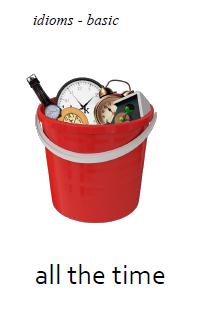Watch a television show clip. These can be downloaded from the internet or recorded directly. Identify and write down all the idioms heard. Discuss how they were used.
-or-
Talk about famous song titles or lyrics to famous songs with idioms. A type of “famous song titles” or “famous song lyrics” on an internet search engine such as Google can provide a good start.
-or-
Use comic section of the Sunday paper. Look for and discuss idioms found. Look for idioms in other sections of the paper, such as sports or arts and entertainment.
-or-
Look for idioms in popular fiction books or books required for classroom reading. Discuss meaning. Discuss why the idioms are used more in fiction versus nonfiction writing.
-or-
Discuss idioms used in sports. Use a recorded telecast, sports page from a newspaper, sports book from the library, or other sports items of interest.
-or-
Look for idioms in commercials, announcements, ads, or anywhere!
Finish It!
Discuss fifteen or twenty idioms prior to activity. Then, state that you’re going to read the idioms in sentences one at a time, leaving out one word. Any student that knows the missing word must raise his or her hand, and takes a guess. If the answer is incorrect, the other students get another chance after hearing the sentence again. Correct answers get one point. An extra point can be earned by telling what the idiom means. The following is an example of two turns of play:
Instructor: “Get ready to raise your hands if you know the missing word. Remember that if you’re wrong, you have to let the others guess after hearing the idiom again. Toward the end of the race, the out of shape man ran out of blank.” Joe raises his hand. “Joe.”
Joe: “Steam. Run out of steam means he got tired.”
Instructor: “Yes! Joe gets two points. Okay. Here comes the next one. Go ahead and tell me the bad news. Don’t blank around the bush.“ Sarah raises her hand. “Sarah.”
Sarah: “Beat. Don’t beat around the bush means don’t take a long time.”
Instructor: “Correct! Two points for Sarah!”
Choices:
- The football player felt (out of place/ wrapped up) at the ballet.
- My little brother likes to (make believe/ never mind) that he’s a superhero.
- The sergeant was (tired out of/in charge of) the squadron.
- We need to be at the appointment at five (on the dot/ make it up).
- It’s (wait a minute/ up to you) how much success you will achieve in life.
- After being picked on by the bully for weeks, the little boy finally decided that it was time to (rub it in/ put his foot down).
- She couldn’t (pass up/ back out of) the extra piece of chocolate cake.
- The serious injury caused all the basketball player’s future dreams to go (like a needle in a haystack/ down the drain).
- My sister has (a different tune/ a soft spot) for small puppies.
- It should (go without saying/ do the trick) that practice makes perfect.
- We had to brainstorm for hours before our plans for the science fair could even (get off the ground/ go through the motions).
Wrong Time, Wrong Place!
Read various idioms and a person whom the idiom is being used with. The person should be an inappropriate target audience for that idiom. The student should explain why the target person is inappropriate.
For example,
- A student tells a teacher, “I want your eyes on the board.”
- A teenager asks his grandmother, “What’s up?”
- A father tells his two year old daughter, “That goes without saying.”
- A marathon runner tells another runner, “Let’s try to get out of shape.”
- A coach tells his team, “We’re winning. Let’s wave the white flag.”
- An employee tells her boss, “You drive me crazy every day.”
- A job applicant says to an interviewer, “I like to let my hair down.”
- A teacher tells her students to answer every test question with the first
answer off the top of their heads. - A five year old tells his baby sister to “Take it easy.”









July 2, 2019 at 6:26 am
Thanks for such a beautiful post, very informative and useful article
LikeLike
August 11, 2023 at 5:30 pm
perryelectric.netPerry Electric Plumbing & A/C Heating Specialists are your go-to experts in Brooking County. Whether it’s for commercial or residential needs, their skilled team offers top-notch service without any call-out fees. Competitive pricing and professional service make them a reliable choice.”
LikeLike
August 11, 2023 at 6:57 pm
julieshummusbar/.comElias and Julie, the dedicated proprietors of Julie’s Hummus Bar & Grill, invite you to experience the richness of Mediterranean cuisine coupled with their genuine commitment to customer satisfaction. Drawing inspiration from the cultural significance of meals in fostering familial bonds, they embarked on a culinary venture that reflects their passion. Witness their vision come to life at Julie’s Hummus Bar & Grill, where Mediterranean flavors and heartfelt service unite.”
LikeLike
August 11, 2023 at 7:09 pm
appliedwatermidwest.com We hold your schedule in high regard, and that’s why our team arrives fully prepared with the necessary tools and equipment for a smooth and trustworthy installation service. Our mission is centered around providing you with a home that benefits from the advantages of soft, clean water, all while ensuring a hassle-free experience.”
LikeLike
August 11, 2023 at 7:47 pm
drinsomniacs.com”Our values are centered around embracing the potential granted by God and maximizing it to the fullest. We acknowledge the imperfections of humanity while striving for greatness. Putting people first, offering heartfelt service, utilizing premium ingredients, and nurturing continuous personal growth are not just beliefs for us but guiding principles that drive everything we do.”
LikeLike
September 7, 2023 at 12:01 pm
The http://essentialshoods.shop/ seems intriguing as it originates from the fashion-forward brand “Fear of God.” Known for its cutting-edge streetwear designs, this hoodie is likely to boast a combination of style and quality. Fashion enthusiasts often appreciate the unique aesthetic and attention to detail that “Fear of God” products offer. If you’re looking for a statement piece to elevate your streetwear game, this hoodie might be a fantastic addition to your collection.
LikeLike